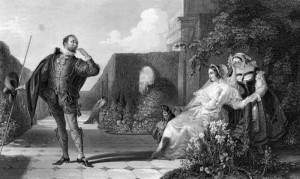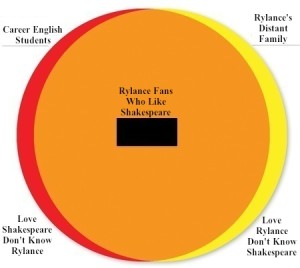With Unrehearsed Twelfth Night coming up soon, I naturally can’t help but think of Mark Rylance.
I was very excited when I first heard about the recent revival of Twelfth Night and Richard III running in rep (and I still am). As anyone who’s read anything about it knows, the show’s big ticket item has been Mark Rylance’s dual performances as Olivia in Twelfth Night and Richard in Richard III. Not surprisingly, Olivia has garnered more attention than Richard, all-male casting being an unfortunate necessity of Original Practices productions of Shakespeare’s works, if they want to maintain their street-cred as “Original Practices.”
Unfortunate marginalization aside, I like Original Practices as a concept. I was elated when I read of the soliloquies actually being spoken to the audience, of the minimalist setting allowing actors to create visions and stories with their words, and especially the use of either daylight or candlelight to create consistent lighting, removing the cinematic clumsiness that deflates nearly every contemporary performance I see nowadays.
The downside is that, with the glowing exception of addressing soliloquies to the audience, nearly every innovation presented and celebrated is decidedly superficial. The costumes have won the most acclaim (after the phallocentric casting), followed by the rituals of bowing, saluting, and sword-work. Conspicuously absent (from the press, at least) are Original Pronunciation and Patrick Tucker’s techniques (which allowed us to create Unrehearsed Shakespeare). If Elizabethan actors rehearsed like we do now, they would have to have rehearsed twenty- to twenty-six shows during the off season before performing them, all in alternating rep, during their on-season. But Tim Carroll can justify his more conventional rehearsals with the fact that these actors are not Elizabethans and need to get used to this stuff: it’s the same excuse we at Unrehearsed use for Text Sessions.
But don’t misunderstand: I am very happy to see a Shakespeare show that doesn’t smother the actors with pomp and glitz, and especially any show that allows the actors and audience to acknowledge each other.
What struck me as odd, more weird than bad, was the synopsis for Twelfth Night. Again, Rylance (a two-time Tony winner) is the cash cow for this show, so both Twelfth Night and Richard III are being billed as Rylance-centric (though Olivia is easily the fifth or sixth character of note in the show).
Here is Broadway.com’s synopsis for Twelfth Night:
“In the household of Olivia, two campaigns are being quietly waged – one by the lovesick lord Orsino against the heart of the indifferent Olivia; the other by an alliance of servants and hangers-on against the high-handedness of her steward, the pompous Malvolio. When Orsino engages the cross-dressed Viola to plead with Olivia on his behalf, a bittersweet chain of events follows.”
Anyone who has worked on or read this show, or even seen it, can’t help but raise an eyebrow at this. Viola, the lead, is practically a footnote. Toby Belch, the largest role and star of many productions, isn’t even named. And Malvolio, the undisputed jewel of the production (and King James’ favorite character, and the deliberate star of many Restoration productions) is assigned a sort of odd antagonist-type role. Jerk, sure; victim, absolutely; but Olivia’s antagonist? That’s marketing. Marketing Rylance. Mark Rylanceting. There’s a joke here somewhere. Come back to me.
I don’t hate it. It’s just odd. I guess they’re trying to draw in bigger audiences, but who? Mark Rylance fans? How does the venn diagram for Rylance fans and Twelfth Night fans look?
… I just really like Shakespeare. Shakespeare’s been big on Broadway this year, which means about as much to me as Shakespeare being big on screen (my share thereof is small), but I do hope these productions will lead to a broader appreciation and understanding of Verse, which will then (hopefully) lead to fuller and more vivacious productions in American theaters.
Better a witty fool than a foolish wit.


